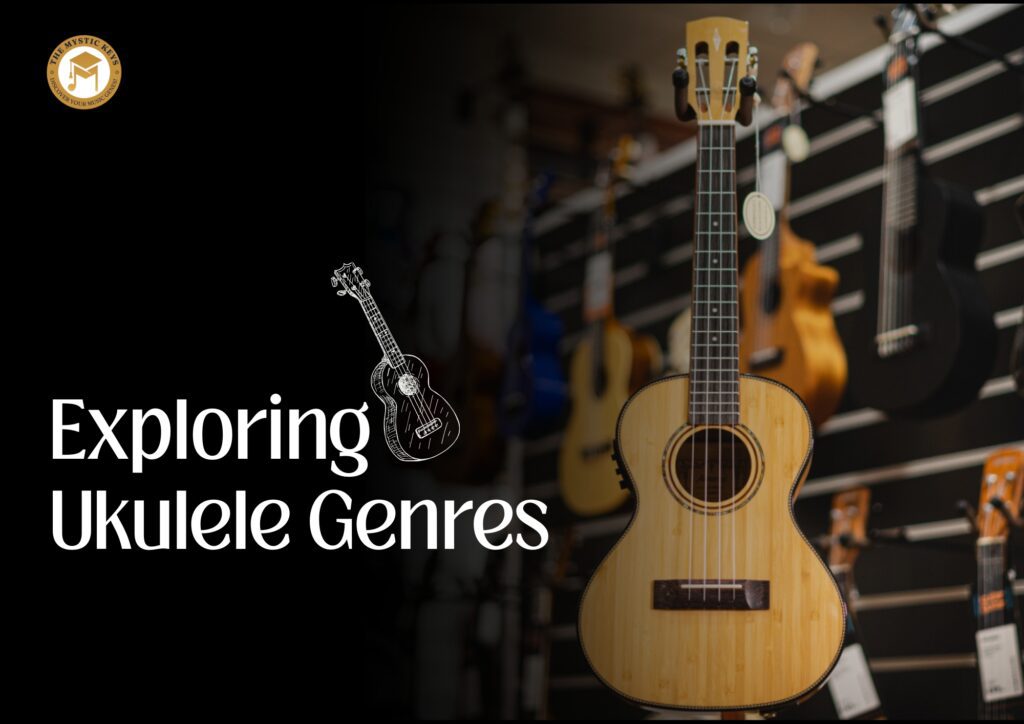Exploring Ukulele Genres | Traditional Hawaiian to Pop and Jazz
When you think of a ukulele, what comes to mind? Maybe it’s the image of a sunny beach in Hawaii, a laid-back strum under a palm tree, or a gentle tune drifting through a quiet afternoon. While these scenes reflect the instrument’s lighthearted charm, they only hint at its true potential. In reality, the ukulele belongs to a surprisingly wide and colorful world of ukulele genres—from traditional Hawaiian and folk to pop, jazz, blues, rock, reggae, and global fusion. Each genre brings out a different facet of the ukulele’s character, showing just how versatile and expressive this small instrument can be.
As we journey through these diverse musical styles, it becomes clear that the ukulele is more than just a symbol of relaxation or a beginner’s tool. Its four strings carry the weight of centuries of musical evolution, cultural exchange, and artistic creativity. In this blog, we’ll explore each ukulele genre one by one—tracing how this modest instrument has carved out a unique space in so many corners of the musical world.
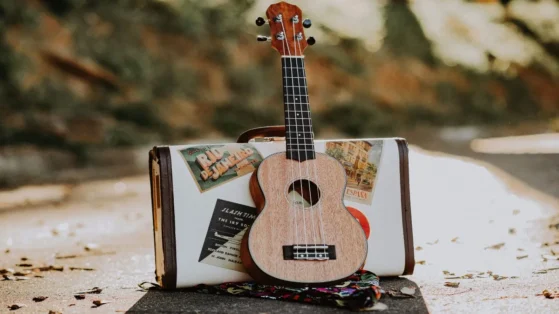
Traditional Hawaiian | The Heartbeat of the Ukulele
Our journey begins in the sun-drenched islands of Hawaii, where the ukulele first took root in the late 1800s. Portuguese immigrants brought a small instrument called the machete de braga, which quickly captured the interest of native Hawaiians. It was adapted into what we now know as the ukulele, meaning “jumping flea”—possibly inspired by the speed of the players’ fingers on the fretboard.
Traditional Hawaiian music features:
Simple major chord progressions
Gentle, rhythmic strumming
Soothing vocals with melodic phrasing
These songs were often lullabies, chants, or celebrations of nature, life, and love. Ukulele players like Israel Kamakawiwo’ole and Jake Shimabukuro have since carried this tradition to the global stage. Kamakawiwo’ole’s iconic version of “Somewhere Over the Rainbow” helped reintroduce the world to the soulful, calming roots of the Hawaiian ukulele sound.
As we drift away from the sunlit shores of Hawaii, where the ukulele first found its voice, we begin to hear it take on new character—blending into the heartfelt storytelling of folk and country music, and gradually adapting to the rich diversity of genres beyond its island home.
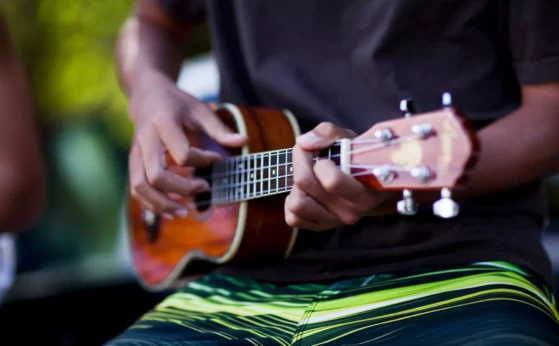
Folk and Country | Storytelling With Strings
Moving inland from its tropical origins, the ukulele genres expand as the instrument finds a natural home within the heart of folk and country music. These styles, celebrated for their emotional storytelling, acoustic foundations, and straightforward arrangements, open up a fresh and meaningful purpose for the ukulele.
While traditional folk genres often revolve around the guitar’s deep, resonant tone carrying the weight of history, the ukulele genres bring in a unique layer of innocence and warmth. Within these settings, the ukulele shines brightest in stripped-down arrangements—where its gentle, melodic voice allows the narrative of the song to take center stage, captivating listeners with simplicity and heartfelt expression.
In this genre, the ukulele:
Often supports lyric-heavy ballads
Blends beautifully with banjos, mandolins, and harmonicas
Enhances campfire-style singalongs
Whether it’s a heartfelt cover of “Wagon Wheel” or a soulful ukulele rendition of “House of the Rising Sun,” the instrument adds an earthy charm that warmly invites listeners in. Because of this timeless appeal, many modern singer-songwriters now lean on the ukulele to infuse freshness into classic folk and country melodies.
Moving beyond these traditional sounds, as we strum away from this earthy soundscape, a more contemporary rhythm gradually begins to emerge…
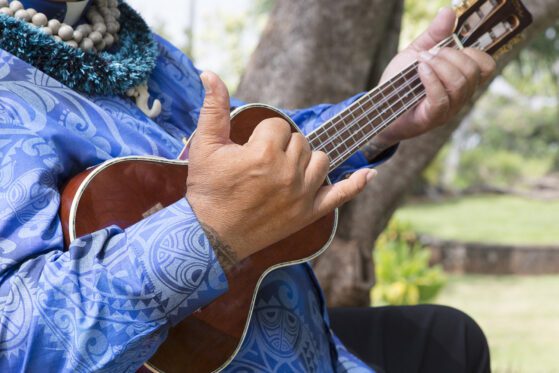
Pop Music | The Ukulele Goes Mainstream
Among the many ukulele genres, the instrument’s biggest modern revival arguably came through pop music. As digital platforms like YouTube exploded in popularity, casual musicians across the globe began sharing heartfelt ukulele covers and original songs, bringing the instrument to the forefront of contemporary music scenes. This surge in accessibility and creativity made the ukulele not only fun to play but also easy to produce music with—even without fancy equipment—cementing its place as a favorite in various ukulele genres worldwide.
Then came the hits:
Suddenly, the ukulele was no longer a niche instrument. It became a pop culture icon.
What makes it perfect for pop?
Bright, catchy tones that complement upbeat lyrics
Easy-to-learn 4-chord progressions (C–G–Am–F, anyone?)
Sing-along friendliness ideal for both solo and group performances
Today, the ukulele thrives in both catchy pop hits and intimate indie tracks. It connects generations—whether it’s teens strumming in their bedrooms or adults rediscovering music with fresh joy.
But just when you think it’s all about simplicity and ease, the ukulele takes an elegant turn—stepping confidently into the world of jazz and beyond.

Jazz | Where the Ukulele Gets Sophisticated
Step into the captivating realm of ukulele genres where jazz stands out as a style defined by complexity, improvisation, and deep emotional expression. Although jazz guitars traditionally dominate this space with their rich chords and intricate solos, the ukulele has successfully carved its own niche within the jazz world. Jazz ukulele embraces the same sophisticated musical language but condenses it into four strings, transforming the instrument into a compact powerhouse of harmony, rhythm, and creative freedom. This evolution highlights how diverse and adaptable ukulele genres truly are, bridging simplicity and musical intricacy with elegance.
Hallmarks of jazz ukulele playing:
Extended chords like major 7ths, 9ths, and diminished variations
Chord-melody techniques allowing simultaneous lead and accompaniment
Swing rhythms, walking bass lines, and expressive phrasing
Legends like Lyle Ritz and Ohta-San have shown that jazz on the ukulele isn’t just possible—it’s captivating. It’s a genre where advanced players can stretch their skills and explore deeply musical terrain.
From smoky clubs to late-night jam sessions, the ukulele proves it’s not just for beginners. It’s a tool for expression, no matter the depth of the genre.

Blues | Expressing Emotion Through Simplicity
As we journey through various ukulele genres, the transition from jazz to blues feels natural. Both are rooted in raw expression, but blues digs even deeper into emotional truth. It’s here that the ukulele surprises us again—with its ability to carry weighty feeling in such a small frame.
Moving away from jazz’s sophistication, blues brings a grittier tone. Yet, the ukulele adjusts seamlessly. It captures sorrow, resilience, and groove—all with remarkable clarity.
To play blues on the ukulele, several essentials come into focus:
First, the 12-bar structure, which forms the genre’s backbone
Then, the use of blue notes and minor pentatonic scales, adding emotional color
Finally, expressive techniques like slides, bends, and muted strums, giving the music character
Despite its size, the ukulele doesn’t fall short. Instead, it rises to the occasion—especially in expressive ukulele genres like blues. With just four strings, it can cry out or calm down, shifting easily from raw emotion to soothing melodies. Whether honoring the legends or crafting something new, this ukulele genre proves that simplicity can still strike deep, connecting player and listener in unexpected ways.

Rock and Indie Rock | Breaking the Mold
Surprisingly, within the broad spectrum of ukulele genres, rock makes an unexpected—but exciting—appearance. Whereas electric guitars blaze and thunder, the ukulele whispers—or, at times, erupts in its own playful shout. In fact, many artists have embraced this contrast: you’ll hear the uke lending a gentle touch to stripped-down acoustic renditions of classic rock anthems, and you’ll spot it as a distinctive, quirky accent in various indie-rock productions.
Rock on uke? Absolutely.
Amanda Palmer uses it in punk-rock storytelling
Indie artists blend it with synths and lo-fi beats
Acoustic ukulele covers of Nirvana or Green Day often go viral
Breaking away from conventional expectations, this genre reimagines familiar sounds in exciting new ways. As the ukulele steps into this fresh landscape, it sheds its usual image and takes on a new role. It becomes more than just an instrument—it emerges as a powerful symbol of creativity and individuality. Through its bright, unexpected tones, the ukulele declares itself unconventional, rebellious, and wonderfully human, adding a distinctive voice that both surprises and delights listeners.
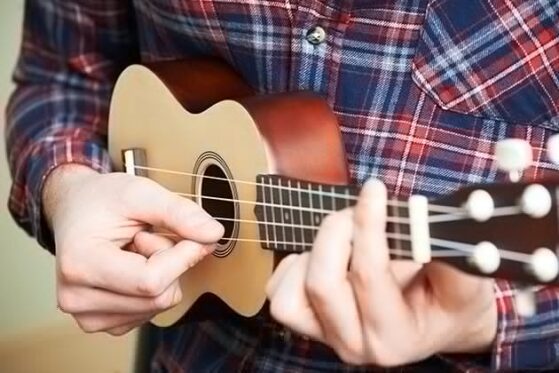
Global Fusion | A Cultural Passport
As music continues to evolve and cultures blend, ukulele genres are crossing borders like never before. No longer limited to Hawaiian melodies, the ukulele is now a global instrument. It speaks many musical languages—and the results are both refreshing and inspiring.
Across continents, artists are fusing local styles with the ukulele’s unique sound. This has led to exciting new ukulele genres that reflect regional character while keeping the uke’s charm alive.
For example:
Bossa nova ukulele from Brazil, with smooth, syncopated rhythms and mellow jazz chords. It’s gentle, yet complex.
Reggae ukulele, marked by offbeat strumming and relaxed, laid-back grooves. Simple, soulful, and unmistakably tropical.
African folk fusion, where the ukulele backs traditional call-and-response vocals. It blends rhythm, story, and community.
Indian pop ukulele, featuring melodic interludes over fast tabla beats. A vibrant mix of tradition and innovation.
Each of these ukulele genres tells a different story. Yet all are bound by one thing—the uke’s ability to adapt and inspire.
Moreover, musicians worldwide are reimagining the ukulele itself. Some design hybrid instruments based on its design. Others explore new playing techniques rooted in their own traditions.
In the end, the ukulele is more than just four strings. It’s a bridge—linking cultures, styles, and generations. And with so many emerging ukulele genres, that bridge is only growing stronger.
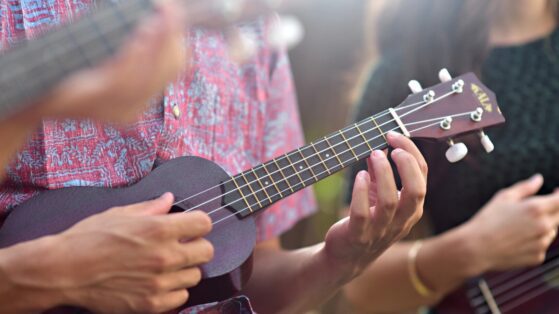
Children’s Music and Music Education
As our journey through ukulele genres begins to round out, it’s impossible to overlook one of the instrument’s most impactful and widespread roles—music education.
From school classrooms to living rooms across the world, the ukulele has quietly become a beloved gateway to music for children and beginners alike. Its charm isn’t just in its sound—it’s in its accessibility, safety, and the joy it brings to young learners.
So, what makes the ukulele such a perfect fit for education?
Its compact size and soft nylon strings are ideal for small, developing hands
It introduces core musical elements like rhythm, melody, and harmony in a simple, hands-on way
Most importantly, it helps build confidence and musical curiosity right from the start
Because of these qualities, many schools have chosen to replace traditional instruments like recorders with ukuleles in their curriculum. And it’s easy to see why—children not only learn faster, but they also have more fun doing it. Educators love the results, and students fall in love with music from the very first strum.
The ukulele isn’t just teaching notes—it’s inspiring the next generation of musicians.

The Ukulele’s Genre-Defying Magic
From the gentle sway of Hawaiian chants to the catchy hooks of modern pop anthems, and from the soulful echoes of smoky jazz bars to the rhythmic pulse of reggae-filled shores, the ukulele has journeyed far and wide—proving its timeless charm in every musical setting. It may appear simple at first glance, but don’t be fooled. Beneath its humble frame lies a remarkably adaptive instrument—one that seamlessly blends into any genre it embraces.
Whether you’re drawn to upbeat melodies, heartfelt ballads, or intricate improvisations, the ukulele welcomes you with open arms. It’s not about flawless technique or years of training; it’s about the joy of discovering sound, expressing emotion, and connecting through music. Whatever your taste, whatever your level—the ukulele offers a space to belong, explore, and grow.
It doesn’t seek perfection. It simply invites you to pick it up, strum a chord, and enjoy the journey ahead.

Ready to Explore These Genres on Your Own Ukulele?
At The Mystic Keys, we believe the ukulele is more than just an instrument—it’s a gateway to a world of music that spans cultures, emotions, and styles. Its gentle strum can carry the spirit of a Hawaiian beach, the soul of a blues riff, or the bounce of a pop melody. But to truly appreciate its range, you need more than chords and strumming patterns—you need guidance, structure, and inspiration.
That’s where our journey begins.
Whether you’re picking up the ukulele for the very first time, curious to play the songs you love, or you’re already familiar with the basics and ready to explore new genres like jazz, folk, or reggae, we’re here to walk that path with you. Every musician starts somewhere—but it’s the learning experience that shapes how far you’ll go.
With our Ukulele Lessons Online, we’ve created a space where creativity meets progression. You don’t just learn how to play—you grow into your own sound. Our lessons are designed to be approachable yet immersive, offering you the flexibility to learn at your pace, while gradually unlocking the full expressive power of the ukulele.
So if you’re ready to explore music in its many forms, let the ukulele be your compass—and let us be your guide.
Because every great musical journey begins with a single note, and unfolds…


